The Pet Cosmetics Market is estimated to be valued at USD 2.2 billion in 2025 and is projected to reach USD 3.9 billion by 2035, registering a compound annual growth rate (CAGR) of 5.7% over the forecast period. In the early years leading up to 2025, growth was moderate, with the market rising from USD 1.7 billion in 2020 to USD 2.2 billion in 2025.
This period reflects the gradual adoption of specialty products such as shampoos, conditioners, and skincare items, primarily concentrated in urban and high-income households. From 2025 onwards, the market will enter a phase of consistent expansion. Between 2025 and 2030, the market grows from USD 2.2 billion to approximately USD 2.8 billion, with annual increments averaging USD 0.1–0.2 billion.
Increasing awareness about pet hygiene, coupled with the introduction of organic and premium products, fuels this growth. Key markets in North America and Europe continue to dominate, while emerging regions, such as the Asia-Pacific, exhibit higher adoption rates, contributing to market diversification. Between 2030 and 2035, the pet cosmetics market continues its upward trajectory, reaching USD 3.9 billion.
Growth is slightly steadier, reflecting market maturation, brand consolidation, and recurring consumer demand. Overall, the market exhibits a healthy, sustained growth pattern, underpinned by lifestyle trends, premiumization, and expanding global awareness of pet care.
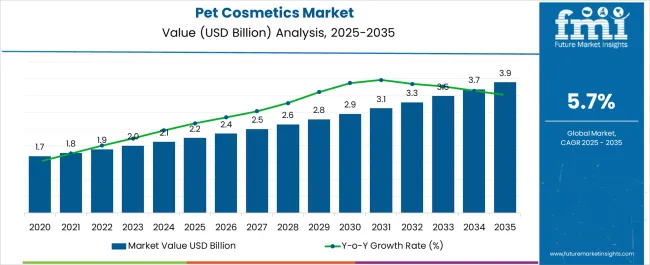
| Metric | Value |
|---|---|
| Pet Cosmetics Market Estimated Value in (2025 E) | USD 2.2 billion |
| Pet Cosmetics Market Forecast Value in (2035 F) | USD 3.9 billion |
| Forecast CAGR (2025 to 2035) | 5.7% |
The pet cosmetics market is expanding rapidly due to rising pet humanization trends, increased awareness regarding pet hygiene, and a surge in premium grooming services. As pet owners increasingly view their animals as family members, demand for high-quality grooming products has surged across urban households.
Social media influence, brand endorsements, and growing participation in pet shows have also played a role in boosting product visibility and demand. Veterinary recommendations and product innovations tailored for sensitive skin, coat nourishment, and pest control are further supporting adoption.
With a heightened focus on pet wellness and aesthetics, the market is expected to continue growing as product affordability, ingredient transparency, and customization options improve across global markets.
The pet cosmetics market is segmented by product type, pet type, price, end users, distribution channel, and geographic regions. By product type, the pet cosmetics market is divided into Shampoo & conditioner, Skin powder, Perfume, Eye care lotion, and Moisturizing balm. In terms of pet type, the pet cosmetics market is classified into Dogs, Cats, and Others (including horses, etc.).
Based on price, the pet cosmetics market is segmented into Low, Medium, and High. By end users, the pet cosmetics market is segmented into Individual pet owners and Professional pet groomers. By distribution channel, the pet cosmetics market is segmented into Online and Offline. Regionally, the pet cosmetics industry is classified into North America, Latin America, Western Europe, Eastern Europe, Balkan & Baltic Countries, Russia & Belarus, Central Asia, East Asia, South Asia & Pacific, and the Middle East & Africa.
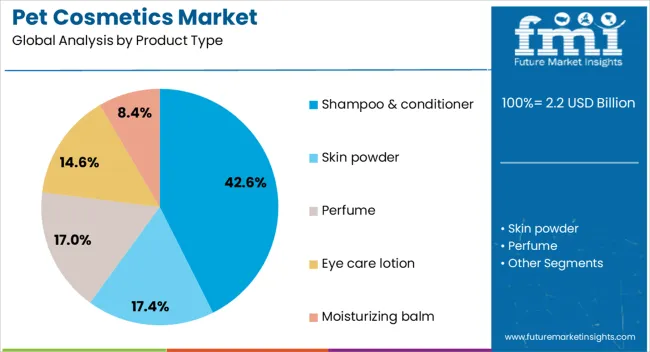
The shampoo and conditioner category is expected to lead the product type segment by capturing 42.60% of total market revenue in 2025. This dominance is attributed to increasing consumer preference for multi-functional grooming products that offer cleaning, conditioning, and treatment benefits in a single application.
These products are widely used across home grooming routines as well as professional pet salons due to their versatility and ease of use. Dermatologically safe formulations and targeted benefits such as anti-itch, detangling, and de-shedding are further enhancing their appeal.
As pet grooming becomes more frequent and essential, the demand for high-performance shampoo and conditioner products continues to strengthen their leading position in the market.
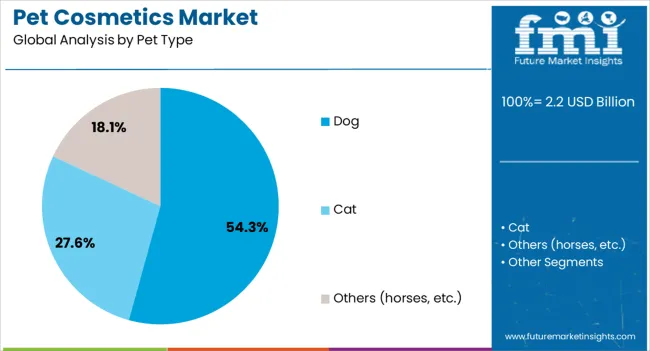
The dog segment is projected to account for 54.30% of the total pet cosmetics market in 2025, positioning it as the leading pet type. This share is driven by the high ownership rate of dogs globally and their regular grooming needs compared to other pet categories.
Increased pet adoption, urban living, and breed-specific grooming regimens have resulted in greater product usage frequency among dog owners. Additionally, product ranges specifically formulated for various coat types, sizes, and skin sensitivities are widely available for dogs, further supporting market dominance.
Growing expenditure on canine grooming and hygiene, coupled with promotional efforts by grooming service providers, continues to elevate this segment’s prominence in the industry.
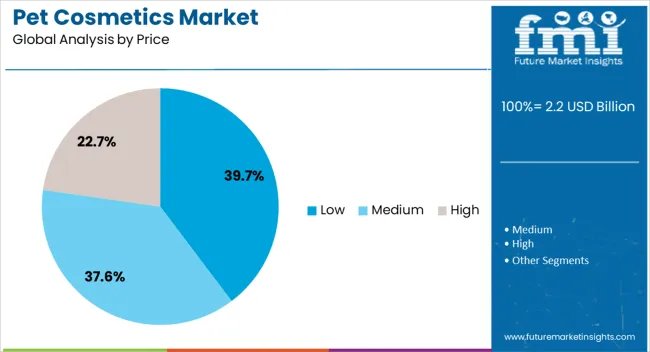
The low-price segment is anticipated to contribute 39.70% of the total revenue in the pet cosmetics market by 2025, reflecting its strong appeal among mass-market consumers. This share is supported by a high demand for affordable grooming products that offer basic hygiene and coat care solutions.
Price sensitivity among pet owners in emerging markets and frequent usage patterns are encouraging the purchase of cost-effective products. Additionally, private label offerings and widespread availability in retail and online channels have made low-priced cosmetics more accessible.
As value-driven consumers prioritize functional performance at an affordable cost, the low price segment remains dominant in driving volume sales across both developed and developing regions.
The pet cosmetics market is witnessing growth as pet owners increasingly focus on grooming, hygiene, and aesthetic care for their pets. Products include shampoos, conditioners, deodorants, paw care solutions, and specialty treatments. Rising awareness about pet wellness, humanization of pets, and disposable income growth drive demand globally.
North America and Europe dominate due to high pet ownership and premium product adoption, while Asia-Pacific is emerging as a key growth region. Market trends emphasize natural, organic ingredients, multifunctional products, and premium formulations. Companies are innovating in sustainable packaging, skin-friendly formulations, and specialized grooming solutions to enhance pet care and owner satisfaction.
Ensuring safe and effective formulations remains a key challenge for pet cosmetics manufacturers. Pets have sensitive skin, and allergic reactions or toxicity risks can arise from inappropriate ingredients.
Variability in regulatory standards across regions further complicates product formulation and labeling. Manufacturers must ensure ingredient transparency, hypoallergenic properties, and veterinary approvals for consumer trust. Until standardized safety testing protocols and consistent regulations are widely implemented, maintaining product safety, efficacy, and consumer confidence will remain a critical concern in the market.
Technological and formulation innovations are driving differentiation in the pet cosmetics market. Natural and organic ingredients, plant extracts, vitamins, and essential oils are increasingly used for skin, coat, and paw care. Multifunctional products-such as deodorizing shampoos or tear stain removers-appeal to convenience-focused pet owners. Companies investing in R&D to develop gentle yet effective products for different pet breeds, ages, and skin types gain competitive advantage. Enhanced packaging, sustainable materials, and eco-friendly production processes further strengthen brand positioning and market appeal.
The pet cosmetics market faces varying regulatory frameworks depending on the region. Some regions classify pet grooming products under cosmetic regulations, while others may treat them as veterinary products requiring additional safety validation. Labels must accurately reflect ingredients, benefits, and usage instructions while avoiding unverified claims. Non-compliance risks penalties, recalls, and reputational damage.
Companies adhering to regional regulations, veterinary guidance, and recognized certification schemes improve market access, build consumer trust, and mitigate legal risks, particularly in North America and Europe where compliance is strictly monitored.
Competition is intensifying among premium, mass-market, and niche pet cosmetic brands. Established players leverage brand recognition, extensive R&D, and multi-channel distribution networks, while smaller entrants compete on price or specialized product offerings. Distribution channels include pet specialty stores, e-commerce, veterinary clinics, and grooming salons.
Supply chain factors, such as sourcing natural ingredients, production scalability, and packaging availability, influence market dynamics. Companies differentiating through product innovation, premium positioning, and sustainable practices gain a competitive edge in a fragmented but rapidly expanding market.
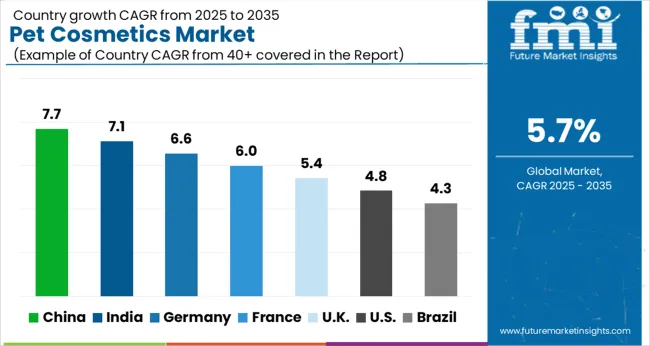
| Countries | CAGR |
|---|---|
| China | 7.7% |
| India | 7.1% |
| Germany | 6.6% |
| France | 6.0% |
| UK | 5.4% |
| USA | 4.8% |
| Brazil | 4.3% |
The global pet cosmetics market is projected to grow at a CAGR of 5.7% through 2035, supported by increasing demand across grooming, hygiene, and pet care applications. Among BRICS nations, China has been recorded with 7.7% growth, driven by large-scale production and deployment in grooming and cosmetic products for pets, while India has been observed at 7.1%, supported by rising utilization in pet care and hygiene products.
In the OECD region, Germany has been measured at 6.6%, where production and adoption for grooming, hygiene, and specialty pet products have been steadily maintained. The United Kingdom has been noted at 5.4%, reflecting consistent use in pet care and cosmetic applications, while the USA has been recorded at 4.8%, with production and utilization across grooming, hygiene, and specialty sectors being steadily increased. This report includes insights on 40+ countries; the top five markets are shown here for reference.
The pet cosmetics market in China is growing at a CAGR of 7.7%, driven by rising pet ownership and increasing consumer spending on pet care products. Urbanization and higher disposable income are encouraging pet owners to adopt grooming and cosmetic products, including shampoos, conditioners, deodorants, and skin treatments. The market is further supported by e-commerce growth and specialized pet retail stores, which make a wide range of products accessible.
Increasing awareness of pet health, hygiene, and aesthetics encourages demand for premium and organic pet cosmetic products. Additionally, marketing campaigns targeting pet wellness and lifestyle contribute to market expansion. Rapid adoption of grooming services and specialty products in metropolitan areas ensures steady growth of the pet cosmetics market across China.
The pet cosmetics market in India is expanding at a CAGR of 7.1%, supported by growing pet adoption and the rising trend of premium pet care products. Pet owners increasingly seek grooming, cleaning, and cosmetic products to maintain their pets’ hygiene and appearance.
Awareness campaigns on pet wellness and health, coupled with the influence of social media, are fueling market adoption. E-commerce platforms and retail outlets are providing greater accessibility to domestic and international cosmetic brands.
The market is also driven by the availability of organic, chemical-free, and specialized grooming products for cats, dogs, and other pets. As pet care spending continues to rise in India, the pet cosmetics market is expected to maintain steady growth, especially in urban centers with higher disposable income.
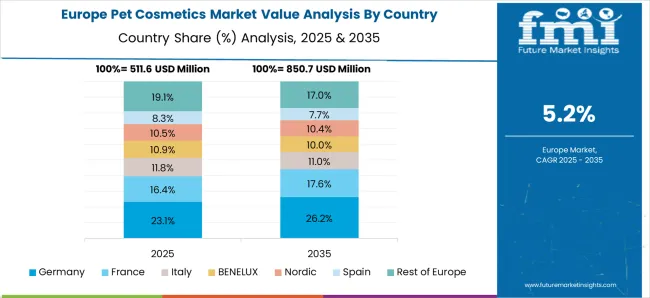
Germany’s pet cosmetics market is growing at a CAGR of 6.6%, driven by increasing awareness of pet wellness and hygiene. Consumers are adopting cosmetic and grooming products for cats, dogs, and small pets to maintain appearance, skin health, and coat quality. The market benefits from organic, chemical-free, and eco-friendly product offerings, aligning with Germany’s focus on sustainable consumer goods.
Pet grooming services and specialty retail stores contribute to market growth. Increasing social awareness of pet health, combined with rising expenditure on premium and high-quality cosmetic products, supports consistent demand. Regulatory standards for pet safety and product quality further enhance consumer confidence in Germany’s pet cosmetics market.
The pet cosmetics market in the United Kingdom is expanding at a CAGR of 5.4%, driven by increasing pet ownership and consumer focus on grooming and hygiene. Premium cosmetic products, organic formulations, and grooming accessories are in high demand. Pet owners are increasingly aware of the importance of skincare, coat health, and overall well-being of their pets, contributing to steady market growth.
Retail chains, e-commerce platforms, and grooming salons facilitate product accessibility and adoption. Marketing initiatives emphasizing pet wellness and lifestyle trends further boost demand. The UK market is expected to see consistent growth as pet cosmetics become a standard part of pet care routines across urban and suburban regions.
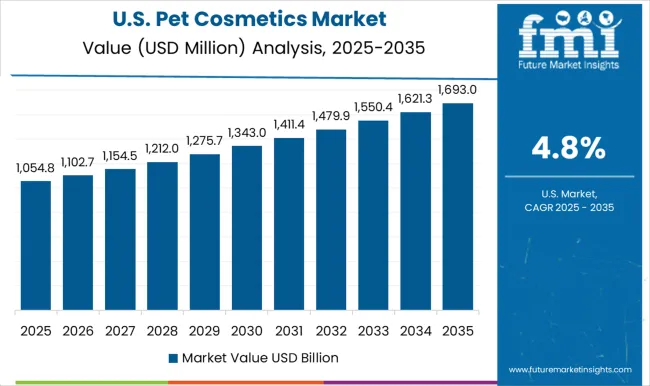
The pet cosmetics market in the United States is growing at a CAGR of 4.8%, fueled by increasing pet ownership and premiumization of pet care products. Grooming products, cosmetics, and skin treatments for dogs, cats, and other pets are widely adopted to maintain hygiene, health, and appearance. The market benefits from growing awareness of natural, chemical-free, and eco-friendly pet products.
Retail outlets, online stores, and specialty grooming salons enhance accessibility and adoption. Marketing campaigns focusing on pet wellness, lifestyle, and aesthetics encourage consumer spending. With rising disposable income and evolving pet care trends, the USA pet cosmetics market is expected to maintain steady growth in both urban and suburban regions.
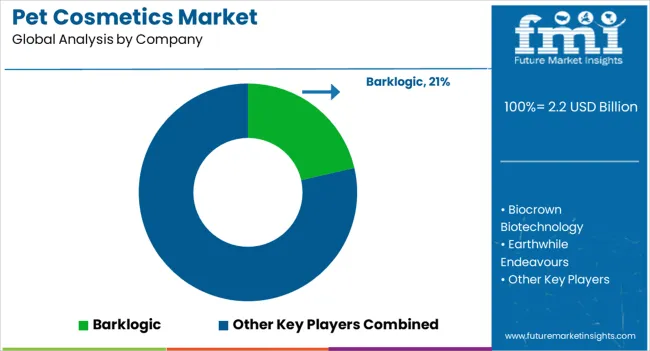
Competition has been shaped by brand equity, dermatologist style claims, and omnichannel reach across pet specialty, grocery, and digital marketplaces. Global and regional brands compete through fragrance free, hypoallergenic, medicated, and waterless lines, plus premium pricing ladders. TropiClean, Earthbath, Wahl, Hartz, SynergyLabs, Pet Head, Isle of Dogs, Animology, Beaphar, Biogance, Yuup, HOWND, and 4 Legger serve as reference players.
Private labels from Petco, PetSmart, and large grocers compress mid tier pricing while Chewy and Amazon favor high turnover assortments. Differentiation has been anchored in colloidal oatmeal and chlorhexidine dermatology ranges, plant derived surfactants, pH balanced recipes, and grooming wipe formats. Professional groomer programs, sample sizes, and seasonal fragrances support velocity. Compliance with EU cosmetic regulations, IFRA fragrance guidance, and clear label claims has been treated as table stakes. Scale in contract manufacturing, packaging agility, and retailer exclusive bundles has defined share movement.
| Item | Value |
|---|---|
| Quantitative Units | USD 2.2 Billion |
| Product Type | Shampoo & conditioner, Skin powder, Perfume, Eye care lotion, and Moisturizing balm |
| Pet Type | Dog, Cat, and Others (horses, etc.) |
| Price | Low, Medium, and High |
| End Users | Individual pet owner and Professional pet groomers |
| Distribution Channel | Online and Offline |
| Regions Covered | North America, Europe, Asia-Pacific, Latin America, Middle East & Africa |
| Country Covered | United States, Canada, Germany, France, United Kingdom, China, Japan, India, Brazil, South Africa |
| Key Companies Profiled | Barklogic, Biocrown Biotechnology, Earthwhile Endeavours, Floof, General Nutrition Centers, Himalaya Drug Company, Innovacyn, Natural Pet Innovations, OM Botanical, Pet ReLeaf, Petco Animal Supplies, Petkin, Spectrum Brands, Super Soaper, and Wildwash |
| Additional Attributes | Dollar sales vary by product type, including shampoos, conditioners, sprays, perfumes, and grooming wipes; by pet type, spanning dogs, cats, horses, and other small animals; by distribution channel, such as online retail, specialty pet stores, supermarkets/hypermarkets, and veterinary clinics; by region, led by North America, Europe, and Asia-Pacific. Growth is driven by rising pet adoption, increasing awareness of pet hygiene and grooming, premiumization of pet care products, e-commerce expansion, and focus on natural and organic ingredients. |
The global pet cosmetics market is estimated to be valued at USD 2.2 billion in 2025.
The market size for the pet cosmetics market is projected to reach USD 3.9 billion by 2035.
The pet cosmetics market is expected to grow at a 5.7% CAGR between 2025 and 2035.
The key product types in pet cosmetics market are shampoo & conditioner, skin powder, perfume, eye care lotion and moisturizing balm.
In terms of pet type, dog segment to command 54.3% share in the pet cosmetics market in 2025.






Our Research Products

The "Full Research Suite" delivers actionable market intel, deep dives on markets or technologies, so clients act faster, cut risk, and unlock growth.

The Leaderboard benchmarks and ranks top vendors, classifying them as Established Leaders, Leading Challengers, or Disruptors & Challengers.

Locates where complements amplify value and substitutes erode it, forecasting net impact by horizon

We deliver granular, decision-grade intel: market sizing, 5-year forecasts, pricing, adoption, usage, revenue, and operational KPIs—plus competitor tracking, regulation, and value chains—across 60 countries broadly.

Spot the shifts before they hit your P&L. We track inflection points, adoption curves, pricing moves, and ecosystem plays to show where demand is heading, why it is changing, and what to do next across high-growth markets and disruptive tech

Real-time reads of user behavior. We track shifting priorities, perceptions of today’s and next-gen services, and provider experience, then pace how fast tech moves from trial to adoption, blending buyer, consumer, and channel inputs with social signals (#WhySwitch, #UX).

Partner with our analyst team to build a custom report designed around your business priorities. From analysing market trends to assessing competitors or crafting bespoke datasets, we tailor insights to your needs.
Supplier Intelligence
Discovery & Profiling
Capacity & Footprint
Performance & Risk
Compliance & Governance
Commercial Readiness
Who Supplies Whom
Scorecards & Shortlists
Playbooks & Docs
Category Intelligence
Definition & Scope
Demand & Use Cases
Cost Drivers
Market Structure
Supply Chain Map
Trade & Policy
Operating Norms
Deliverables
Buyer Intelligence
Account Basics
Spend & Scope
Procurement Model
Vendor Requirements
Terms & Policies
Entry Strategy
Pain Points & Triggers
Outputs
Pricing Analysis
Benchmarks
Trends
Should-Cost
Indexation
Landed Cost
Commercial Terms
Deliverables
Brand Analysis
Positioning & Value Prop
Share & Presence
Customer Evidence
Go-to-Market
Digital & Reputation
Compliance & Trust
KPIs & Gaps
Outputs
Full Research Suite comprises of:
Market outlook & trends analysis
Interviews & case studies
Strategic recommendations
Vendor profiles & capabilities analysis
5-year forecasts
8 regions and 60+ country-level data splits
Market segment data splits
12 months of continuous data updates
DELIVERED AS:
PDF EXCEL ONLINE
Pet Joint Health Supplement Market Size and Share Forecast Outlook 2025 to 2035
Pet Food Collagen Market Size, Share, Trends, and Forecast 2025 to 2035
Pet Cognitive Supplement Market Size and Share Forecast Outlook 2025 to 2035
Pet Food Pulverizer Market Size and Share Forecast Outlook 2025 to 2035
Pet Food Emulsifier Market Size and Share Forecast Outlook 2025 to 2035
PET Film for Face Shield Market Size and Share Forecast Outlook 2025 to 2035
Pet Perfume Market Size and Share Forecast Outlook 2025 to 2035
Pet Shampoo Market Size and Share Forecast Outlook 2025 to 2035
Pet Tick and Flea Prevention Market Forecast and Outlook 2025 to 2035
Pet Hotel Market Forecast and Outlook 2025 to 2035
PET Vascular Prosthesis Market Size and Share Forecast Outlook 2025 to 2035
Pet Food Preservative Market Forecast and Outlook 2025 to 2035
Petroleum Liquid Feedstock Market Size and Share Forecast Outlook 2025 to 2035
Pet Food Ingredients Market Size and Share Forecast Outlook 2025 to 2035
PET Stretch Blow Molding Machines Market Size and Share Forecast Outlook 2025 to 2035
PET Injectors Market Size and Share Forecast Outlook 2025 to 2035
PET Material Packaging Market Size and Share Forecast Outlook 2025 to 2035
Petri Dishes Market Size and Share Forecast Outlook 2025 to 2035
Petroleum And Fuel Dyes and Markers Market Size and Share Forecast Outlook 2025 to 2035
Petrochemical Pumps Market Size and Share Forecast Outlook 2025 to 2035

Thank you!
You will receive an email from our Business Development Manager. Please be sure to check your SPAM/JUNK folder too.
Chat With
MaRIA